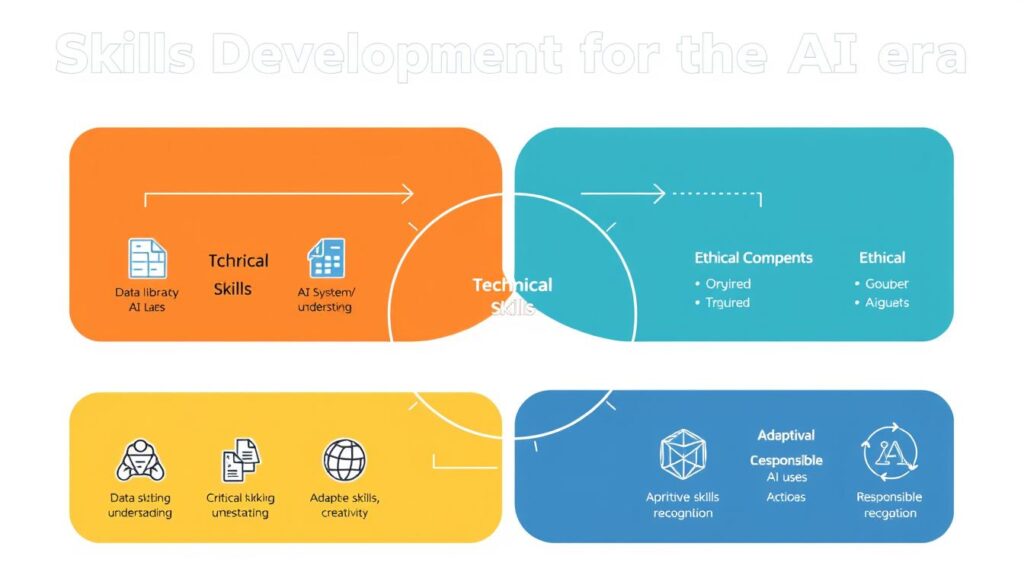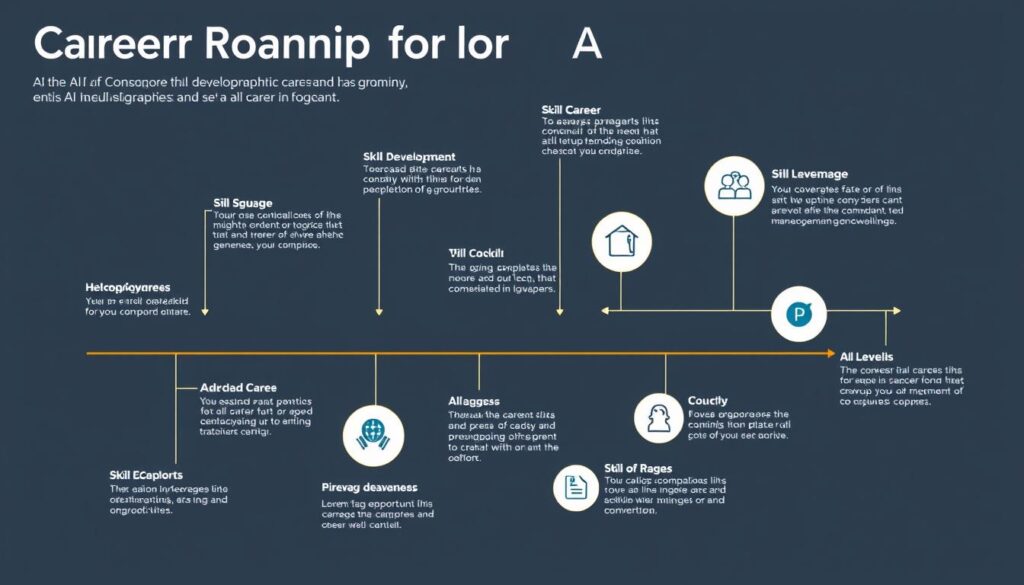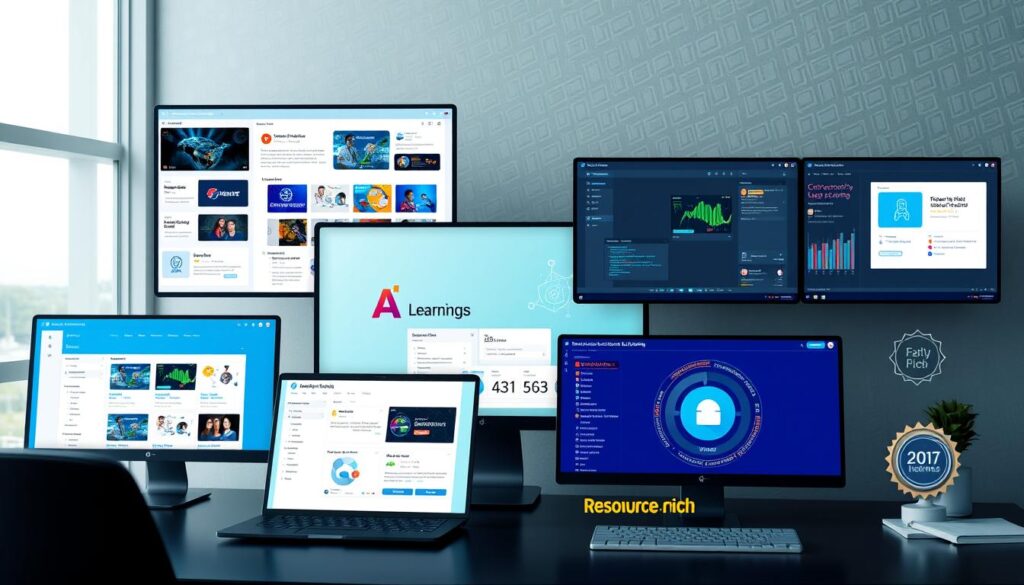
AI and Future Skills in Career Development: Preparing for 2025 and Beyond
Artificial intelligence is rapidly transforming the workplace, reshaping job roles, and creating new career opportunities at an unprecedented pace. As we approach 2025, professionals across industries face a critical question: How can we develop the right skills to thrive in an AI-driven future? This article explores the evolving landscape of career development in the age of AI, identifying essential skills and strategies to help you navigate this technological revolution with confidence.
The AI-Driven Workforce of 2025
By 2025, AI will have fundamentally altered the employment landscape across virtually every industry. According to recent projections, generative AI alone will significantly impact 90% of jobs within the next decade. This transformation isn’t simply about job displacement—it’s about job evolution and the creation of entirely new roles that we’re only beginning to imagine.

Key Trends Reshaping Careers
Automation of Routine Tasks
AI systems are increasingly capable of handling repetitive, rule-based tasks across industries. By 2025, we’ll see widespread automation of data entry, basic analysis, scheduling, and other routine functions. This shift will free human workers to focus on more complex, creative, and strategic activities that leverage uniquely human capabilities.
Augmentation of Human Capabilities
Rather than simply replacing humans, AI tools are increasingly designed to enhance human performance. AI-powered analytics platforms, decision support systems, and creative tools will become essential companions for professionals, enabling them to work faster, make better decisions, and solve more complex problems.
Emergence of New Roles
The AI revolution is creating entirely new job categories. Roles like AI ethics officer, human-machine teaming manager, and algorithm bias auditor didn’t exist a decade ago but will become increasingly common. The World Economic Forum estimates that while 85 million jobs may be displaced by automation by 2025, 97 million new roles may emerge.
Hybrid Skill Requirements
Tomorrow’s professionals will need to combine technical literacy with strong human skills. The ability to work alongside AI systems, interpret their outputs, identify their limitations, and apply human judgment will become increasingly valuable across virtually all knowledge work.
Assess Your AI Readiness
Wondering how prepared you are for the AI-driven workplace of 2025? Take our comprehensive assessment to identify your strengths and development areas.
Top 5 Future-Proof Skills for the AI Era
As AI systems take on more routine and predictable tasks, certain human capabilities become increasingly valuable. The most successful professionals in 2025 and beyond will develop a balanced portfolio of technical, adaptive, and ethical competencies that complement rather than compete with AI.

1. AI Literacy and Systems Thinking
While not everyone needs to become a data scientist or machine learning engineer, basic AI literacy will be essential across virtually all professional roles. This includes understanding:
- How AI systems work and their fundamental capabilities
- The types of problems AI excels at solving
- The limitations and potential biases of AI systems
- How to effectively collaborate with AI tools in your specific domain
- The ability to see connections between systems and anticipate ripple effects
2. Data Fluency and Analytical Thinking
As organizations become increasingly data-driven, the ability to work with, interpret, and communicate insights from data will be crucial. Key capabilities include:
- Basic statistical literacy and data interpretation
- The ability to ask the right questions of data
- Critical evaluation of data quality and limitations
- Translating data insights into business value
- Communicating data-driven insights to non-technical stakeholders
3. Human-Centered Skills and Emotional Intelligence
As AI handles more analytical and routine tasks, uniquely human capabilities become more valuable. These include:
- Advanced communication and storytelling
- Empathy and interpersonal understanding
- Negotiation and conflict resolution
- Cultural intelligence and diversity awareness
- Team leadership and collaboration across human-AI teams
4. Creative Problem-Solving and Innovation
While AI can optimize existing processes, human creativity remains essential for breakthrough innovation. Key skills include:
- Design thinking and user-centered innovation
- Lateral thinking and connecting disparate ideas
- Comfort with ambiguity and experimentation
- Identifying problems worth solving
- Translating creative concepts into practical solutions
5. Ethical Judgment and Responsible AI Use
As AI systems become more powerful, ensuring their ethical deployment becomes critical. This requires:
- Understanding ethical frameworks for technology use
- Identifying potential biases and harmful impacts
- Balancing efficiency with fairness and inclusion
- Advocating for responsible AI deployment
- Considering long-term societal implications of AI systems
Develop Your Future-Proof Skill Portfolio
Ready to build the skills that will keep you competitive in the AI era? Download our comprehensive guide to developing these five essential competency areas.
Case Studies: Organizations Leading AI-Skill Integration
Forward-thinking organizations are already reimagining their approach to talent development in response to AI’s growing capabilities. These case studies highlight innovative approaches to building AI-ready workforces.

Global Financial Services Firm
A leading financial institution implemented a comprehensive “AI for Everyone” initiative that created three distinct learning pathways:
- AI Awareness: Basic literacy for all employees
- AI Application: Practical skills for implementing AI solutions
- AI Development: Advanced capabilities for technical teams
The program combined online learning, hands-on projects, and mentorship. Within 18 months, the company reported a 35% increase in AI-enabled process improvements and significant gains in employee confidence with AI tools.
Healthcare Provider Network
A regional healthcare system developed a cross-functional approach to AI integration, focusing on collaborative human-AI teams rather than individual skill development alone.
Their “AI Augmentation Labs” brought together clinicians, data scientists, and operations staff to identify high-value use cases and develop integrated workflows. This team-based approach not only accelerated AI adoption but also reduced resistance by emphasizing how AI could enhance rather than replace human expertise.
Key outcomes included a 28% reduction in administrative burden for clinicians and improved diagnostic accuracy in radiology.
Manufacturing Conglomerate
A global manufacturer took a proactive approach to workforce transformation by creating an internal “Future of Work” academy. Rather than waiting for AI to disrupt jobs, they:
- Mapped vulnerable roles and identified transition pathways
- Created personalized learning journeys for at-risk employees
- Developed internal certification programs for emerging roles
- Established an internal talent marketplace to match skills with opportunities
This approach allowed them to redeploy 85% of employees from automated functions to higher-value roles, maintaining institutional knowledge while building new capabilities.
“The organizations that thrive in the AI era won’t be those that simply deploy the most advanced technology. They’ll be the ones that most effectively combine human and machine intelligence, creating systems that leverage the unique strengths of both.”
Learn from Industry Leaders
Join our upcoming webinar featuring talent development executives from organizations successfully navigating the AI transition.
Challenges and Ethical Considerations
While AI offers tremendous opportunities for career advancement and organizational transformation, its implementation raises significant challenges that must be addressed thoughtfully.

The Digital Divide in Skill Development
Access to AI skill development opportunities remains unevenly distributed. Organizations and policymakers must address:
- Geographic disparities in access to training
- Economic barriers to education and upskilling
- Demographic gaps in technical education pipelines
- Varying levels of digital literacy across workforce segments
Without deliberate intervention, AI could exacerbate existing inequalities rather than creating broadly shared opportunities.
Ethical AI Implementation
As AI systems become more powerful and ubiquitous, ensuring their ethical use becomes increasingly important. Key considerations include:
- Algorithmic bias and fairness
- Transparency and explainability of AI systems
- Data privacy and consent
- Appropriate human oversight and intervention
- Long-term societal impacts of automation
Professionals across roles will need to develop the capacity to identify and address these ethical dimensions.
The Reskilling Challenge
The pace of technological change creates significant challenges for workforce development. Organizations must navigate:
- Identifying which skills will remain valuable long-term
- Developing effective learning pathways for mid-career professionals
- Balancing immediate productivity with long-term capability building
- Creating cultures that support continuous learning
The traditional model of front-loaded education followed by career application is increasingly obsolete in the face of rapid technological change.
Human-AI Collaboration Models
Developing effective human-AI teaming approaches remains a work in progress. Organizations are experimenting with:
- Task allocation between humans and AI systems
- Interface design for effective human-AI interaction
- Trust calibration and appropriate reliance
- Organizational structures that support hybrid teams
Finding the right balance between automation and augmentation will be critical for maximizing both productivity and human potential.
The Importance of Lifelong Learning
Perhaps the greatest challenge—and opportunity—of the AI era is the shift toward continuous skill development throughout one’s career. The half-life of technical skills continues to shrink, making the ability to learn, unlearn, and relearn a fundamental meta-skill for future success.
Building Your Future Career Roadmap
Navigating career development in the age of AI requires a strategic approach that balances immediate skill building with long-term adaptability. Here’s a framework for developing your personal AI-era career roadmap.

- Inventory your current technical and human skills
- Identify which of your tasks could be automated or augmented
- Research how AI is transforming your industry
- Evaluate your learning preferences and constraints
- Identify your unique human advantages
Assess
- Experiment with AI tools relevant to your domain
- Connect with professionals in AI-adjacent roles
- Identify emerging roles that match your interests
- Research skill requirements for target positions
- Consider lateral moves that build transferable skills
Explore
- Create a personalized learning plan with milestones
- Balance technical and human skill development
- Seek hands-on projects to apply new capabilities
- Build a portfolio demonstrating AI-relevant skills
- Find mentors who have navigated similar transitions
Develop
Key Principles for AI-Era Career Development
Focus on Complementary Skills
Rather than competing directly with AI capabilities, develop skills that complement automation. Areas like complex problem-solving, ethical judgment, interpersonal communication, and creative thinking remain distinctly human domains where AI augmentation (rather than replacement) is the likely pattern.
Adopt a Portfolio Approach
Rather than specializing narrowly, develop a diverse portfolio of skills that creates unique combinations. The intersections between domains (e.g., technical understanding + industry knowledge + communication skills) often create the most resilient career positions in times of technological change.
Embrace Continuous Learning
The half-life of technical skills continues to shrink. Develop a personal learning system that allows you to continuously acquire new capabilities. This includes allocating regular time for learning, identifying high-quality resources, and building reflection practices to consolidate new knowledge.
Seek Augmentation Opportunities
Look for roles and projects where you can develop experience working alongside AI systems. The ability to effectively collaborate with AI tools—understanding their capabilities, limitations, and appropriate use cases—will be increasingly valuable across virtually all knowledge work.

Start Building Your AI-Era Career Today
Download our comprehensive career planning template to map your skill development journey for the AI era.
Essential Resources for AI Skill Development
The landscape of learning resources for AI-related skills continues to expand rapidly. Here are some high-quality starting points for your development journey.
Online Learning Platforms
Industry Reports & Whitepapers

“The illiterate of the 21st century will not be those who cannot read and write, but those who cannot learn, unlearn, and relearn.”
Conclusion: Embracing the AI-Enabled Future
The rise of artificial intelligence represents both a challenge and an unprecedented opportunity for career development. While certain tasks and roles will be transformed or automated, AI also creates new possibilities for human work that is more creative, strategic, and meaningful.
The professionals who will thrive in this new landscape will be those who develop a balanced portfolio of technical and human skills, maintain a growth mindset, and proactively seek opportunities to work alongside AI systems rather than compete with them.
By starting your skill development journey today—assessing your current capabilities, exploring emerging opportunities, and building a personalized learning plan—you can position yourself not just to survive but to thrive in the AI-enabled workplace of 2025 and beyond.

Take the First Step Today
The future of work is being shaped now. Start your AI skill development journey with our comprehensive resources and tools.
Frequently Asked Questions
Will AI completely replace human workers in most industries?
While AI will automate certain tasks and transform many roles, complete replacement of human workers across industries is unlikely. Instead, we’re seeing a shift toward human-AI collaboration, where AI handles routine, predictable tasks while humans focus on areas requiring creativity, ethical judgment, interpersonal skills, and strategic thinking. The most likely scenario is job evolution rather than wholesale elimination.
I’m not in a technical role. Do I still need to develop AI skills?
Yes, though the depth and type of skills needed will vary by role. Even in non-technical positions, basic AI literacy—understanding what AI can and cannot do, how to effectively use AI tools in your domain, and the ethical considerations of AI deployment—will become increasingly important. The goal isn’t necessarily to become a technical expert but to develop sufficient understanding to effectively collaborate with AI systems and specialists.
How can organizations support employees through this transition?
Forward-thinking organizations are taking several approaches, including: creating structured learning pathways for different roles and skill levels; providing dedicated time and resources for skill development; implementing internal mobility programs to help employees transition to emerging roles; developing ethical frameworks for AI deployment; and fostering a culture of continuous learning and experimentation. The most successful organizations view AI skill development as a strategic investment rather than simply a training expense.
What industries will be most affected by AI in the near future?
While AI will impact virtually all sectors, some industries facing particularly significant transformation include: financial services (automated analysis, personalized recommendations, fraud detection); healthcare (diagnostic support, treatment planning, administrative automation); manufacturing (predictive maintenance, quality control, supply chain optimization); retail (inventory management, personalized marketing, customer service); and professional services (document analysis, research automation, basic content creation). However, even within heavily impacted industries, the human elements of creativity, judgment, and interpersonal connection will remain essential.
